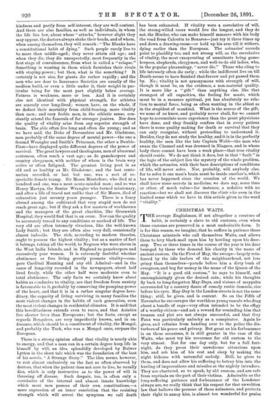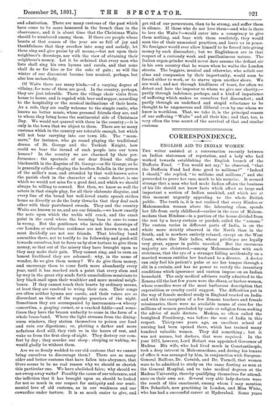CHRISTMAS WAITS.
THE average Englishman, if not altogether a creature of habit, is certainly a slave to old customs, even when those customs are preserved in a most undesirable form. It is for this reason, we imagine, that he suffers in patience those Christmas minstrels who call themselves Waits, and allows them to levy black-mail upon him by howling upon his door- step. Two or three times in the course of the year is his door besieged by those who demand his charity in the name of ancient custom. On the First of May, the sweeps—largely rein- forced by the idle loafers of the neighbourhood, not less grimy than themselves—parade before him a dirty bush of evergreen, and beg for money in the name of the Queen of the May. "It is a good old custom," he says to himself, and uncomplainingly gives the desired coin ; while his thoughts fly back to long-forgotten May-Days, and visions of maypoles surrounded by a country dance of comely rustic damsels, rise before his eyes. May-Day in the London streets is not the same thing ; still, he gives, and is content. So on the Fifth of November he encourages the worthless young rascals who drag about a bundle of rags—very often intended to be the effigy of a worthy citizen—and ask a reward for reminding him that treason and plot are not always successful, and that Guy Faux was particularly unlucky as a conspirator. Again he gives, and refrains from handing over to the police the dis- turbers of his peace and privacy. But great as his forbearance is on these occasions, it is still greater in the case of the Waits, who must try his reverence for old custom to the very utmost. Not for one day only, but for a full fort- night, do they press their unwelcome attentions upon him, and rob him of his rest and sleep by making the night hideous with untuneful melody. Still, he gives to them, and does not allow his suffering to betray him into the hurling of imprecations and missiles at the nightly intruders. They are chartered, so to speak, by old custom, and are safe from reprisals on the part of their victims. Admirable as the long-suffering patience and forbearance of the Londoner always are, we really think that his respect for that unwritten law that hallows the persons of these nuisances, and protects their right to annoy him, is almost too wonderful for praise
and admiration. There are many customs of the past which have come to be more honoured in the breach than in the observance; and it is about time that the Christmas Waits should be numbered among them. If there are people whose hearts at that season of the year are so fall of joy and thankfulness that they overflow into song and melody, let them sing and give praise by all means,—but not upon their neighbour's doorsteps, nor with the view of obtaining their neighbour's money. Let it be ordained that every man who lists shall sing his own hymns and carols, and that none shall do so for hire or for the sake of gain ; so will the winter of our discontent become less musical, perhaps, but also less melancholy.
Of Waits there are many kinds,—of a varying degree of -villainy, for none of them are good. In the country, perhaps, they are just tolerable. There the village choir visits from house to house, and is regaled with beer and supper, according to the hospitality or the musical inclinations of their hosts. As a rule, they are really welcome to the simple rustic, who knows no better music, whose personal friends they are, and to whom they bring home the sentimental side of Christmas Day. We would not quarrel with them in the country ;—it is 'only in the town that we object to them. There are so many ,customs which in the country are tolerable enough, but which will not bear carrying into our town life. The " mum- mers," for instance, who go round playing the traditional drama of St. George and the Turkish Knight, how could we bear the inroad of such people into our town homes ? In the country we are charmed by their per- formance: the spectacle of our dear friend the village blacksmith in the disguise of St. George—or Sir George, as he is generally called—slaying the heathen Saladin in the person of the miller's man, and attended by that well-known actor the parish clerk in the character of a comic doctor, is one which we would not miss for a good deal, and which we should always be willing to reward. But then, we know so well the actors in that simple play, for all their elaborate disguise, and ,every line of the broad but well-loved rustic speech strikes home as directly as do the lusty thwacks that they deal each other with their pasteboard swords. They and the country Waits are known to us, and are our friends,—we know exactly the note upon which the treble will crack, and the exact point in the carol where the booming bass is sure to come in wrong. But the gentlemen who invade the doorsteps of our London or suburban residence are not known to us, and most decidedly are not our friends. That hireling band assembles there, not to testify to its fellowship and good-will towards ourselves, but to force us by slow torture to give them money, so that out of the misery they have brought upon us they may make their gain. They cannot sing, and to earn an honest livelihood they are ashamed : why, in the name of wonder, do we give them money ? We do give them money, and encourage them to come forth more abundantly every year, until it has reached such a point that every slam and "by-way in the great city sends forth unmelodious musicians to levy black-mail upon their wealthier and more musical neigh- -bours. If they cannot touch their hearts by ordinary means, at least they are resolved to wring their ears. Their songs are often neither hymns nor carols, and their voices are as discordant as those of the regular prowlers of the night. Sometimes they are accompanied by instruments—a wheezy 'concertina, a gasping cornet, or a cracked fiddle—and some- times they have the brazen audacity to come in the form of a whole brass-band. Where the light streams from the dining- room windows, they station themselves to poison our food and ruin our digestions; or, plotting a darker and more nefarious deed still, they visit us in the hours of rest, and wake us from the first sleep of night. They destroy our com- fort by day ; they murder our sleep : sleeping or waking, we would gladly be without them.
Are we so firmly wedded to our old customs that we cannot bring ourselves to discourage them ? There are so many older and better customs that have fallen into abeyance, that there seems to be no real reason why we should so cherish this particular one. We have abolished fairs ; why should we not sweep away waits P Possibly the cause of our tolerance, and the infliction that it has brought upon us, should be looked for not so much in our respect for antiquity and our senti- mental love of old customs, as in our weakness and our .cowardice under torture. It is so much easier to give, and get rid of our persecutors, than to be strong, and suffer them in silence. If those who do not love them—and who is there to love the Waits ?—would enter into a conspiracy to give them nothing, and bear with them resolutely, they would soon tire of their unmusical practices, and leave us in peace. No foreigner would ever allow himself to be forced into giving money by such discomfort; but we Englishmen are in that respect of a curiously weak and pusillanimous nature. The Italian organ-grinder would never dare assume the defiant air in his own country that he wears when he walks the London streets. The beggars, musical and otherwise, who solicit our alms and compassion by their importunity, would soon be forced either to work, or to starve upon another shore. We are weak ; and not through kindliness of heart, for often we detect and hate the impostor to whom we give our charity,— partly through indolence, perhaps, and a kind of impatience of suffering which makes us ourselves feel discomfort ; and partly through an undefined and stupid reluctance to be thought to be ungenerous and illiberal even by one whom we know is worthless. That, we take it, is the principal reason of our suffering " Waits " and all their kin ; and that, too, is very often the true secret of the survival of that and similar customs.



































 Previous page
Previous page